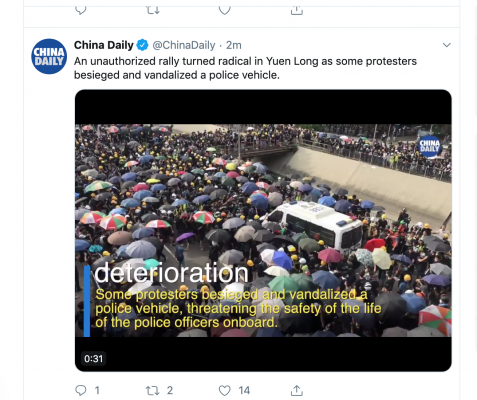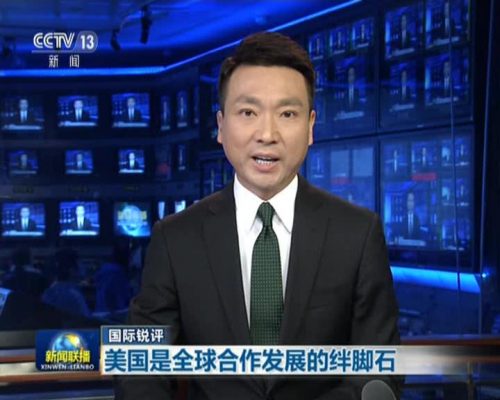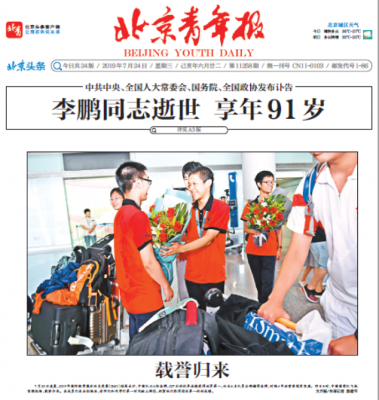China’s official media were busy this week pushing a hard line on Hong Kong, and stressing the point that demonstrators in the city are troublemakers. Here is a tweet posted today on the official Twitter account of China Daily, the newspaper published by the State Council Information Office. For more on Hong Kong, see our recent analysis.

Also this week, state media reported the death of former premier Li Peng, who has been known outside China as the “Butcher of Beijing” for his decisive role in the bloody crackdown on pro-democracy demonstrators in Tiananmen Square on June 4, 1989. Media reports about Li referred to June Fourth only as a “counter-revolutionary revolt,” and praised Li’s “important role” in putting an end to the movement. But one paper, Beijing Youth Daily, made a serious error in its layout of the Li story — another case of how press control in China can be taken to absurdities.
Our roundup of the week’s top stories is below, starting with the use the highly sexist term “complaining woman syndrome” in an official commentary on CCTV’s nightly news program attacking “some people” in the United States for being irrational and inhibiting China’s development.
_______________________
This Week in China’s Media
July 20-26, 2019
➢ Official Nightly Newscast Xinwen Lianbo Accuses US of Having “Complaining Woman Syndrome”
➢ Party Media Address the Hong Kong Issue
➢ Beijing Youth Daily Makes Layout Error in Reporting Death of Li Peng
➢ People’s Daily Online Issues First “Internet Content Risk Management Certificates”
[1] Official Nightly Newscast Xinwen Lianbo Accuses US of Having “Complaining Woman Syndrome”
In recent days, the official nightly newscast Xinwen Lianbo (新闻联播) has made liberal use of online neologisms to sharply criticize the United States for ongoing trade tensions that have thwarted China’s development. These terms include “makes people spit out their food” (令人喷饭), which means that something is so ridiculous it invites ridicule; “crazy fits of rage and jealousy” (羡慕嫉妒恨); and the clearly sexist “complaining woman syndrome” (怨妇心态).

During the news program on July 25, anchor Kang Hui (康辉) read out an international commentary called “Who Is Actually Bullying and Scaring Others All Over the World?” (究竟谁在全球到处欺侮恫吓他人?) in which he used the phrase “complaining woman syndrome” to criticize the United States for having “double standards.” The use of this term in an official commentary drew lively discussion online.
On July 26, another international commentary was called “America’s ‘Complaining Woman Syndrome’ is a Stumbling Block for Global Cooperation and Development” (美国的“怨妇心态”是全球合作发展的绊脚石). The commentary said that some people in the US had “crazy fits of rage and jealousy” over China’s economic power. These unspecified people, who the commentary also said had “complaining woman syndrome,” lost their composure when they saw others developing. In an apparent reference to Huawei, the commentary said that using national power to suppress a Chinese enterprise, and preventing other countries from using 5G networks from Chinese companies, “presented a prime example of despicable activity to the entire world.”
KEY SOURCES:
CCTV News (via Sina.com): 美国的“怨妇心态”是全球合作发展的绊脚石
CCTV Weibo account (@央视新闻): 今天的#新闻联播#在“饭点儿”讲了件荒唐事,大家听了可别“喷饭”啊
[2] Party Media Address the Hong Kong Issue
On July 21, the People’s Daily ran a front-page commentary called “Opposing Violence and Treasuring Rule of Law and Order Together” (共同反对暴力 珍惜法治秩序), which addressed the issue of unrest in Hong Kong. The commentary said: “Hong Kong cannot grow chaotic again, this is the mainstream view in Hong Kong, and the common feeling of all who care about the Hong Kong people.” Former Hong Kong chief executive C.Y. Leung (梁振英) posted to facebook: “Like the vast majority of Hong Kong people, I hope that the clause in the Basic Law about the [intervention of the] People’s Liberation Army’s (PLA’s) Hong Kong garrison does not need to be invoked, and I hope Hong Kong police can effectively control the situation. But the precondition is that these destructive forces operating behind the scenes immediately stay their hand.”
A page-one commentary in the People’s Daily the next day took a strong line on the July 21 incident in which protestors — referred to in the commentary as “radical demonstrators” (激进示威者) and “extremists” (激进分子) — massed at the entrance of the Liaison Office of the Central Government in Hong Kong and pelted the building, including the national emblem of the People’s Republic of China, with black paint, eggs and other projectiles. The commentary was firm in its stance that, as the headline itself read, “The Authority of the Central Government Cannot Be Challenged.” It does affirm the “One Country, Two Systems” formula, but it makes clear that protesters have, in the leadership’s view, “impinged on the bottom-line” by directly attacking the authority of the central government. “We firmly support the Hong Kong SAR Government,” the commentary said, “in employing every legal means to ensure the security of offices of the Central Government in Hong Kong, to preserve rule of law in Hong Kong, and to punish these criminals.”
On July 24, Xiakedao (侠客岛), the WeChat public account operated by the overseas edition of the People’s Daily, said in a post that “certain foreign media” in Hong Kong had “instigated violence” (煽动暴力). It said that the New York Times, the BBC, Apple Daily and other media had all implied in news reports following a press briefing by PLA official on July 24 about the release of China’s national defense white paper that the PLA would become involved in the Hong Kong situation.
KEY SOURCES:
People’s Daily (人民日报): 共同反对暴力 珍惜法治秩序
Ta Kung Pao (大公报): 梁振英:国家主权完整必须捍卫
Xinhua News Agency (新华社): 中国政府发表《新时代的中国国防》白皮书
WeChat public account “Global Times” (微信公众号“环球时报”): 国防部发言人一句话回应香港记者提问
WeChat public account “Xiakedao” (侠客岛): 【解局】在香港,这些媒体如此煽动暴力
[3] Beijing Youth Daily Makes Layout Error in Reporting Death of Li Peng
Following the death of former Premier Li Peng (李鹏), the news was reported in media across China using standard Xinhua News Agency releases. The Beijing Youth Daily, a newspaper published by the Beijing chapter of the Chinese Communist Youth League, ran a front-page headline across the top of the page on July 24 that read, “Comrade Li Peng, 91, Passes Away” (李鹏同志逝世, 享年91岁). Below the headline, however, was an unrelated image, taking up about half of the page, of smiling people wearing red clothing and carrying fresh flowers, with a large caption that read, “Returning with Honor” (载誉归来). The photo, as the caption explained, was of Chinese competitors returning from the International Mathematical Olympiad, at which China and the United States were the top-ranked countries.

The pairing of the photograph with the announcement of Li Peng’s death was presumably a careless breach of media discipline on the part of the newspaper. By July 25, this edition of the Beijing Youth Daily was no longer available online.
Coverage of Li Peng’s death from official state media referred to the June 4th, 1989, crackdown on Tiananmen Square as a “counter-revolutionary revolt” (反革命暴乱), and said Li Peng had “played an important role” (发挥了重要作用) in quelling the incident.
KEY SOURCES:
People’s Daily (人民日报): 中共中央 全国人大常委会 国务院 全国政协讣告 李鹏同志逝世
Beijing Youth Daily (北京青年报): 7月24日电子报(无法阅览)
[4] People’s Daily Online Issues First “Internet Content Risk Management Certificates”
From July 26-27, People’s Daily Online issued its first batch of “Internet Content Risk Management Certificates” (互联网内容风控师(初级)证书) to certify personnel for online content controls after relevant training sessions for government personnel, public opinion research experts from People’s Daily Online, industry experts and others. Topics covered at the trainings included policy briefings (政策解读), self-media chaos analysis (自媒体乱象), content risk prevention mechanisms (内容风险防控体系) and so on. 74 participants from various new media took part in the training.
KEY SOURCES:
People’s Daily Online (人民网): 人民网发放首批互联网内容风控师证书

David Bandurski
CMP Director



















